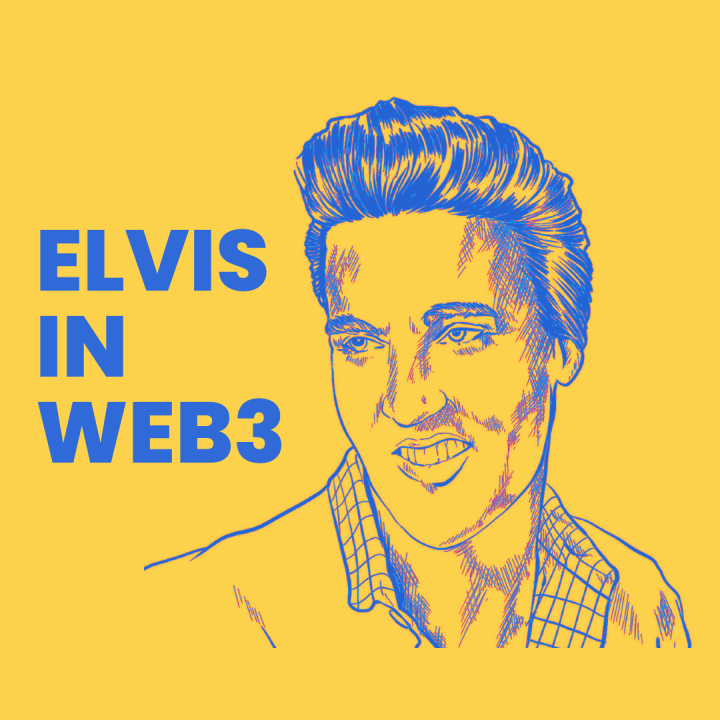
My wife and I recently saw the Elvis movie, and it made me think of Web3.
What does Web3 have to do with the King of Rock n’ Roll?
A lot!
The movie focuses on the exploitation of Elvis by his longtime manager, Colonel Tom Parker.
Elvis was a poor kid from the South working as a truck driver. He was amazingly talented, but Elvis had no way of reaching an audience without the help of a record label and a promoter.
Someone had to pay for and manage studio time, backup musicians, vinyl record production, distribution to record stores, promotion, booking of concert halls and collection of all of the money screaming fans would pay.
In the pre-Web 1950s, an artist like Elvis had no choice but to have someone like Colonel Parker manage all of these things for him.
Parker’s cut: allegedly 50%.
WWED (What Would Elvis Do) in Web2?
Fast-forward 67 years, what would a young Elvis, born in 2002 rather than 1935, do if he were just starting out in 2022?
We’re well into the second generation of the Web, known as Web2 in which platforms exist for creative folks to reach audiences. Of course, a young Elvis would release videos of his early songs on YouTube, build a fanbase on Instagram and Tik Tok and release an album on Spotify.
And how would that work for him?
Let’s start with Spotify, at least one source estimates that recording artists get about 5% to 25% of the revenue from streaming on Spotify. Another source estimates that Spotify pays about 0.0033 to $0.0054 per stream. So it, takes about 250 streams of a song to earn a $1.
Lord Almighty! That’s a lot of listens to “Burning Love” just to make a buck. And that money doesn’t even get paid directly to the artist. Generally, the dollar goes to the record label and the artist gets as little as 20 cents of that.
How about YouTube? Assuming a young Elvis would get enough views for Google to even put ads on his channel, according to at least one estimate Google pays creators a 55% revenue share. That’s about $3 to $5 for every 1,000 video views. Again, that’s a lot of hip-shaking video views to make 3 – maybe 5 – bucks.
And then there’s Instagram and Tik Tok. Instagram doesn’t really share anything with creators. Tik Tok will share 50% of ad revenue, but that applies only to the very top creators on the platform.
Of course, young Elvis could seek out sponsorship opportunities (“Hey guys, don’t you just love this new hair gel I’m using ….”). But that’s expecting either Elvis would have the sophistication to cut his own deals with sponsors or, much more likely, rely on an agency to do it for him, with a good chunk of the revenue going to the agency.
The Web 2.0 platforms actually make Colonel Tom Parker seem like a pretty fair and reasonable guy. He was only taking a 50% cut.
Of course, there is the possibility that Elvis would hit it so big on these social media platforms that he’d blow up like Justin Bieber, Shawn Mendes or Halsey. But Elvis would have had to have kept his day job while struggling in his early days as a musician. With the supply chain demands in the current economy, the average truck driver makes more than $70,000. “Don’t quit your day job” sounds like pretty good advice.
Elvis in Web3
So, this is where Web3 comes in. The theory (again, it’s mostly theory still) is that in the third generation of the web, known as Web3, tech will enable creators to directly engage their fans, with no greedy Tom Parker, Instagram, Tik Tok or Spotify as an intermediary. It’s more like the Dollar Shave Club direct-to-consumer model.
Early numbers show some truth to this theory. OpenSea, a marketplace for NFTs, takes 2.5% of sales. Axie Infinity, an NFT-based video game with an-app economy shares 95%+ plus of transaction amounts with players. There are criticisms of both of these business models, but they are at least nascent indicators of the level of sharing of that the Web3 industry is willing to do.
Other Web3platforms, including Rally, Mirror and BitClout are sharing 90+%. Note: There’s a lot more on this point in this thread by Chris Dixon of VC fund a16z, which was a source for some of the above (but also note there is a strong counterview).
Add in the possibility of raising money through the sale of NFTs that would give Elvis capital for travel expenses and recording studio time, not to mention some spending money. NFTs also could serve as passes for Elvis’ fans to engage in experiences like concerts (virtual and in-person) and meet-ups with the King.
Of course, Web3 has not gotten off to the smoothest of starts. If the past few years are any indication, Elvis would probably get scammed out of his crypto, had his NFTs stolen from his virtual wallet and then he’d be frozen out of withdrawals from his Celsius account. That’s if he didn’t get in trouble with the SEC for selling unregistered securities.
Still, though, there is some hope that if core issues with Web3 can be solved, then it can be a platform that ensures the creators in our world receive fair compensation for their talents and efforts.

